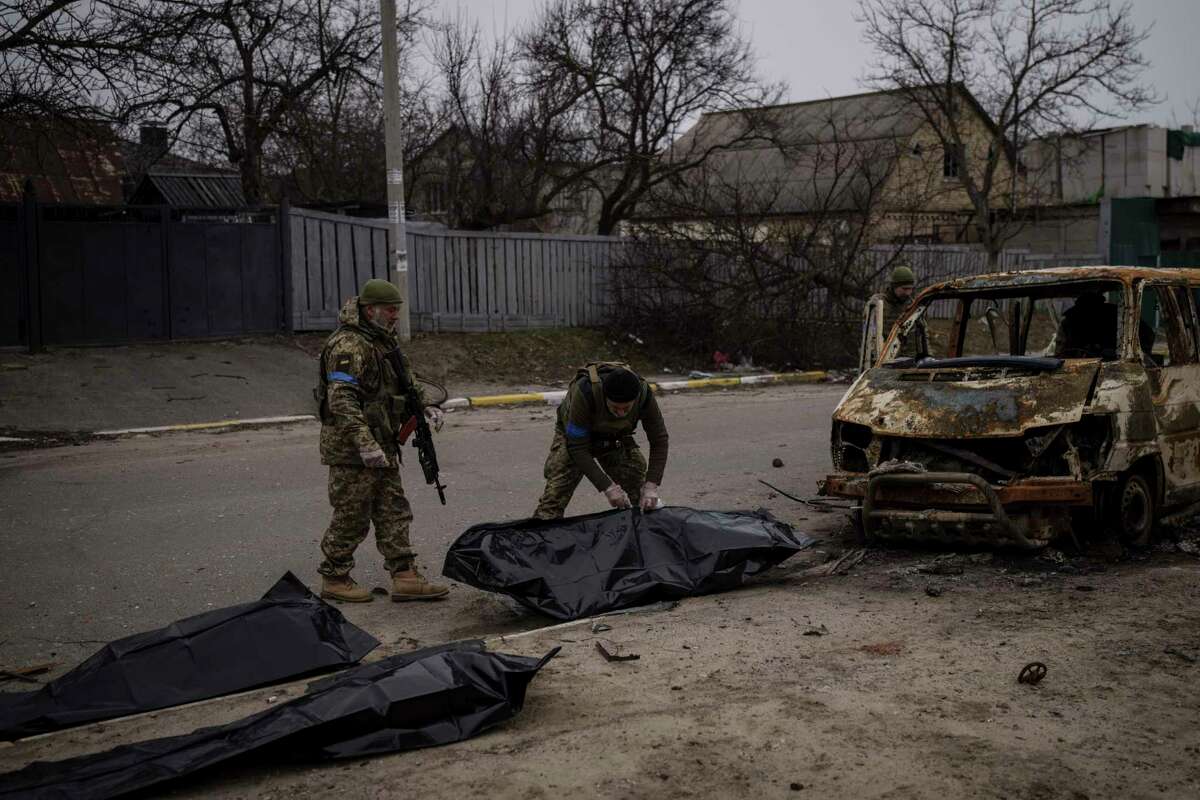Pilgrimage tourism to boost Jammu’s economy: CM
Chief Minister Omar Abdullah on Tuesday said that his government is committed to boosting Jammu’s economy through tourism pilgrimage promotion.
The International Monetary Fund (IMF) has said in its World Economic Outlook that the “global outlook is expected to decline this year to 3.6 per cent, down from 6.1 per cent in 2021”.

Soldiers line up corpses in a war torn Ukraine (AP file photo)
It is a measure of the enormity of the economic crisis across the world that the war in Ukraine and the pandemic, if now withering, have fuelled inflation and impeded the recovery of the fragile global economy. The twin challenges have baffled central bankers in the United States of America and Europe as they are seemingly intent on bringing down inflation without slowing growth to the extent of recession. International organisations and think tanks are tweaking their forecasts for growth and trade as they assess the dislocation caused by the war to global energy, food and commodity supplies. To these can be added China’s stringent lockdowns to contain a renewed outbreak of the virus.
The outlook is gloomy, even at the mildest estimation. The International Monetary Fund (IMF) has said in its World Economic Outlook that the “global outlook is expected to decline this year to 3.6 per cent, down from 6.1 per cent in 2021”. This is a downgrade from a January forecast of 4.4 per cent growth this year. “Global economic prospects have been severely set back, largely because of Russia’s invasion of Ukraine,” the IMF’s chief economist, Pierre-Olivier Gourinchas, wrote in a blog accompanying the report. “This crisis unfolds even as the global economy has not yet fully recovered from the pandemic.” It thus comes about that the “spring meetings” of the IMF and the World Bank in Washington this week will be riveted to economic concerns.
Advertisement
Going by the prognosis of the IMF’s chief economist, close to two months after Russia invaded Ukraine, the conflict has impeded growth and spurred inflation. This has been described as a “clear and present danger for many countries”. In his reckoning, disruptions to Russian supplies of oil, gas and metals will impinge on the commodities markets and across the global economy like “seismic waves”. And almost inevitably, it will disrupt Ukraine’s export of wheat and corn. The “trajectory of the global economy” will of course depend on how the war proceeds and the “ultimate breadth of the sanctions” that the United States and its allies in Europe and Asia impose on Russia. “Uncertainty about these projections is considerable and well beyond the usual range,” Mr Gourinchas said. “Growth could slow down further while inflation could exceed our projections if, for instance, sanctions extend to Russian energy exports.” Even if supply chain problems ease, rising prices around the world show no signs of abating, according to the IMF. It expects inflation to remain “elevated” throughout the year, projecting it at 5.7 per cent in advanced economies and 8.7 per cent in emerging markets. Economists generally expect global growth to decline from 5.8 per cent in 2021 to 3.3 per cent annually in 2022 and 2023. It is direly significant that the World Bank has warned that the “linger- ing pandemic” could amplify income inequality and poverty rates. We live in very difficult times.
Advertisement
Advertisement